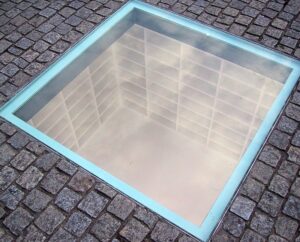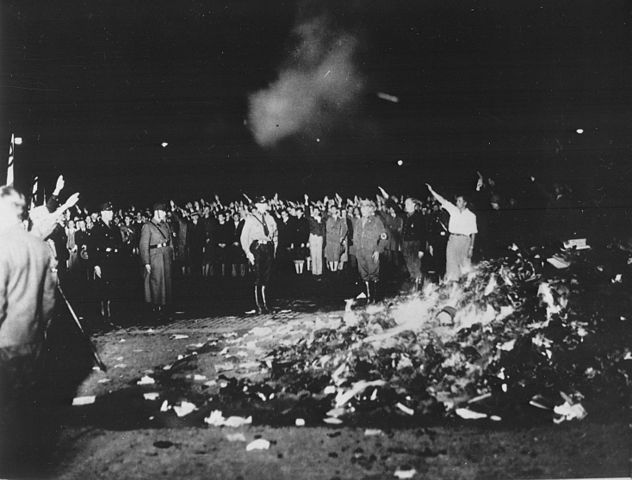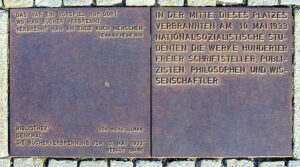
In a city renowned for massive monuments, the most poignant of Berlin’s memorial structures lies unnoticeable beneath the cobblestones of a square separating the Berlin State Opera from the historic Humbolt University. Anyone crossing this busy square known as Bebelplatz could easily overlook the presence of this subterranean monument. Furthermore, nothing about its glass cover or explanatory plaque sunken into the cobblestones would induce a person to wander over and take a look.
Yet, if one does, the mind and heart of the viewer nearly explode! The Empty Library by Israeli sculptor Micha Ullman (b. 1939) was installed on the very spot where Nazi ideologues on May 10, 1933 dragged stacks of banned books and tossed them into a raging bonfire. These c. 20,000 volumes represented every discipline imaginable, penned by esteemed geniuses of the past and present. Jewish geniuses. The 19th-century poet Heinrich Heine’s lyrics were burned right along with the revelatory formula of Albert Einstein. The insanity of it must have terrified anyone living nearby that night. Still (some must have reasoned), was it not high time to rid the world of these non-Aryan “perversions”?

How prophetic were Heine’s words from 1820:
That was only a prelude;
where they burn books,
they will ultimately burn people also.Das war ein Vorspiel nur dort;
Wo Man Bücher verbrennt,
Verbrennt Man am Ende auch Menschen.

Only a few years after the banning and burning of these books, the systematic destruction of careers, lives, and actual physical bodies laid waste to millions of Europe’s “offensive” citizens—the spiritual grandchildren of those banned authors.
How many times I have led my tour groups across Bebelplatz, stopping to explain Ullman’s monument and watch their shock as they meditate on this terrible night. Eyes search the cubicle’s gleaming white walls and empty white shelves, simultaneously recoiling from its bareness.
Never during any of those respectful moments did it occur to me that we, here in America, would find ourselves engulfed in a movement to ban books. Never could I have envisioned a campaign to cancel careers and destroy people’s lifework. It just couldn’t happen here! We were the land of free expression. We possessed inalienable rights of Free Speech guaranteed by our Founding Fathers against exactly such oppression and written in our Constitution’s Bill of Rights. How arrogant now seems my naiveté as I recall those feelings.
The vast majority of Americans agree that truly sick or deranged publications should have no place in the public arena (and sadly such titles still circulate freely under the same noses of technocrats instituting these ideological book-banning today). Furthermore, until very recently, most Americans would have defended an author’s right, historically or in the present, to express ideas contrary to their own views. I daresay most Americans not too long ago would have scoffed at the possibility that our country might engage in the purging of divergent ideas.
We all know that the very real wrongs of any country, past or present, must never be denied or diminished. But of all of the nations that have striven to make corrections of past errors, we here in the United States shine as the finest example. In the world’s eye, we still do shine.
If we cannot regain perspective and apply a mature, reasoned approach to the problems of our past, then deadly dark days lie ahead. Poets like Heine are rarely wrong. And dark days will last until we remember how to resurrect the wisdom needed to make positive changes while honoring the gifts and glories of our heritage.
Meanwhile, could we not all, please, stop and take a breath? Could we not imagine ourselves standing in Bebelplatz, whether huddled fearfully in the shadows in 1933 or poised thoughtfully around Ullman’s monument today? We need to let the message of The Empty Library wash over us. For only such realizations have any chance of stopping the madness.




Brava!
Thank you for writing. Yes, these are troubling times.
What a great post. Thank you for this reminder.
Totally agree! We need to be sober minded these days!
Very timely message! I completely agree. Well said!
Heine’s poem is chilling as is the photo in your post. FYI: Wikipedia has two articles on Ullman’s memorial: “The Empty Library” and “Memorial in memory of the burning of books.” Thanks, as always, for your timely insights.
Sadly, we lived in dumbed-down times and people have lost the ability to think rationally.
Thank you Professor Carol;
I am reading Nazi Ecology; The Oak Sacrifice of the Judeo-Christian Worldview in the Holocaust, R. Mark Musser. I’m at pg 130 and I already have a clear, clear understanding of the Why the book burnings happened. It can and will happen again (and far worse as you state); if those that celebrate the bannings do not wake up!